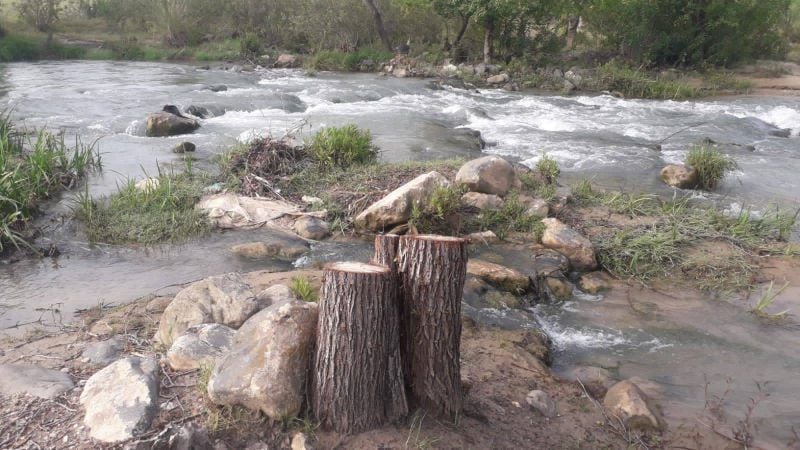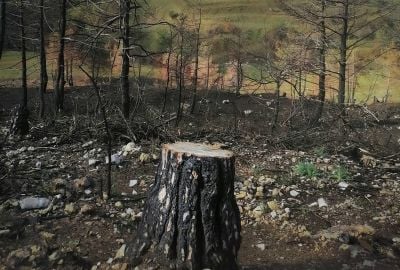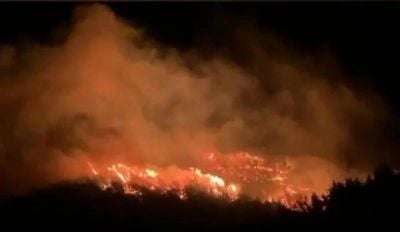
Trunks of illegally cut trees near the Litani River. (Credit: Sami Alawiyeh)
For months, various environmental associations have denounced the mass logging of century-old trees which have been used as firewood since the rise of fuel prices. Unlicensed tree logging has become a widespread practice in Lebanon and puts the country at risk of ecological disaster.
In Qobeiyat, Bireh and Fneideq in Akkar, eco-massacres take place almost daily and are met with general indifference.
This illegal practice has become rampant in nearly every part of the country, from Kesrouan (Mount Lebanon), to some parts of the Bekaa Valley and even in villages in South Lebanon.
This week, the alarm was sounded by the Litani River Authority in the south after a mass amount of trees were logged off the shores of Lebanon’s largest river, on state-owned land.
Speaking to L’Orient-Le Jour, the authority’s director Sami Alawiyeh denounced what he referred to as “cartels of firewood, similar to fuel cartels.” According to Alawiyeh, instances of illegal logging have also been reported in the neighboring towns of Jarmaq in Jezzine, “where the surroundings of the Khardali river are now desertified,” Zrarieh in Saida, and around several Marjayoun villages.
“Hundreds of trees have been cut down, including pines, eucalyptus, cypresses and elder trees, especially on state-owned land. This suggests that some people want to seize public property by clearing it of trees protected by law,” said Alawiyeh.
“These actions are most likely taking place with the complicity of competent authorities, who turn a blind eye,” said Alawiyeh who himself works in public administration.
“We filed a complaint, along with the municipality of Jarmaq, against a man suspected of being involved in these loggings. But the justice system has still not taken up the case,” he said.
Thousands of trees logged
In Akkar, the logging of trees continues unabated, despite having decreased slightly since the end of winter. According to L’Orient-Le Jour’s Akkar correspondent, several Cilician fir trees, a species protected by law, have been cut down in Wadi al-Assouad in Qammouaa, as well as in the Ghabet al-Azer (Azer Forest).
“We hear the sound of chainsaws every day and nobody does anything, especially in Wadi Oudine, in the locality of Aandkit,” Mohammad Orabi, an environmental activist and board member at Lebanon Eco Movement, told L’Orient-Le Jour.
“We don't know the exact extent of the damage, but thousands of trees were certainly cut down in 2022, including many oak trees in Bazbina and pine trees in Ain Yaakoub. That is not to mention the areas affected by fires last year where trees were cut down in large numbers by loggers,” he said.
Fires devastated several localities in Akkar in 2021, reducing entire swathes of greenery to ash.
The same fires spread as far as Hermel in the Bekaa Valley and to some nearby Syrian villages. Orabi denounced “the lack of arrests” related to the cases. Offenders are quickly released on condition that they vow “not to do it again,” he said. Orabi also suspects that local elected officials are facilitating the illegal logging, “but without evidence we can do nothing,” he said.
Antoine Daher, who heads the Environmental Committee of Qobeiyat, a local NGO, also accused the authorities of turning a blind eye. “Many pine trees and hundred-year-old oaks have been cut down in the region. All Akkar is affected by this plague and nobody reacts,” he said.
Disrupted natural habitat
Caretaker Agriculture Minister Abbas Hajj Hassan, whose ministry is responsible for forest management in the country, called for “a tougher law and high fines for violators.” He said that a draft law for the preservation of green spaces is under consideration in the parliamentary committee on agriculture.
“The draft law that we presented recommends multiplying by 10 the fines, compared to the current fines, and provides a prison sentence of seven days in case the offense was repeated. We risk losing our forests if nothing is done,” said the minister, stating that 3,000 fines were issued in the last year and a half, but that incidents have not stopped.
“The most frightening wave of logging took place in October and November. This phenomenon has decreased in recent days, but it is still a problem,” he added. He also called for “a national plan for the protection of forests.”
The ecological impact of this continuous logging could be dangerous in the long run. The director of the Land and Natural Resources Program at Balamand University, George Mitri, noted that the loss of hundreds-year old trees is already irreparable. “We need two or three hundred years to have trees like the ones that are cut down. It is an ecological, cultural, economic and heritage loss,” he said.
He also warned against the disruption of the natural habitat of some animals and damage to the flora that grows in the Lebanese forests.
“If we continue on this path, we may also face more drought, a lack of water, higher temperatures and lower humidity, which could affect the climate in Lebanon.”
This article was originally published in French in L'Orient-Le Jour. Translation by Joelle El Khoury.

